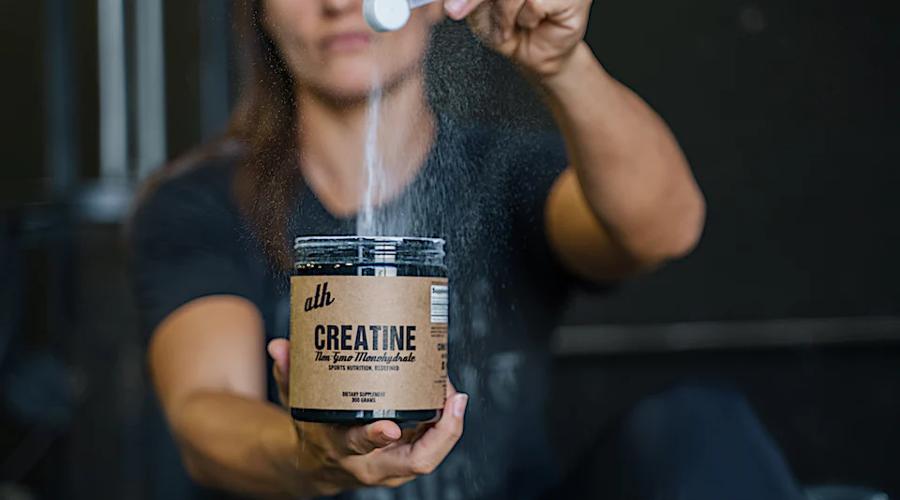
What is Creatine Monohydrate?
Creatine monohydrate is a popular dietary supplement that is commonly used by athletes and bodybuilders to improve physical performance and increase muscle mass. It is a compound made up of three amino acids – arginine, glycine, and methionine – and is naturally found in small amounts in foods such as beef, pork, and fish.
Creatine monohydrate works by increasing the body’s production of ATP (adenosine triphosphate), a molecule that provides energy to muscles during physical activity. By supplementing with creatine monohydrate, individuals can enhance their ability to perform high-intensity exercise, improve muscle recovery, and increase muscle size.
Creatine monohydrate is available in various forms, including powders, capsules, and tablets, and is generally considered safe when taken in recommended doses. However, like any other supplement, it is important to be aware of its potential side effects and interactions with other medications. Additionally, it is crucial to store creatine monohydrate properly to ensure its longevity and effectiveness.
Read more about BCAA Drinks

Factors Affecting Creatine Monohydrate Expiration
Manufacturing processes
The manufacturing process of creatine monohydrate can have a significant impact on its expiration date. The quality of the raw materials used, the purity of the product, and the manufacturing environment are all factors that can affect its shelf life.
One key factor is the purity of the creatine monohydrate. High-quality creatine monohydrate is typically at least 99% pure, while lower-quality products may contain impurities or contaminants that can reduce their shelf life. Additionally, the manufacturing process must be carefully controlled to prevent the formation of byproducts that can degrade the product over time.
The temperature and humidity of the manufacturing environment can also impact the shelf life of creatine monohydrate. High temperatures and humidity can cause the product to break down more quickly, while lower temperatures and humidity levels can help to preserve its potency.
Finally, the packaging of creatine monohydrate can also play a role in its expiration date. The product should be packaged in airtight containers that protect it from light and moisture, as exposure to these factors can degrade the product over time.
Storage conditions
Proper storage conditions are crucial for maintaining the shelf life of creatine monohydrate. When stored correctly, creatine monohydrate can last for several years without losing its potency.
One key factor is temperature. Creatine monohydrate should be stored in a cool, dry place away from direct sunlight and heat sources. High temperatures can cause the product to break down more quickly, while cooler temperatures can help to preserve its potency.
Humidity is another important factor to consider. Exposure to high levels of humidity can cause creatine monohydrate to clump and lose its potency. To prevent this, the product should be stored in an airtight container with a desiccant packet to absorb any moisture.
Finally, it is important to avoid exposure to light. Creatine monohydrate should be stored in a dark, opaque container to protect it from light, which can cause the product to break down more quickly.
Packaging
The packaging of creatine monohydrate can have a significant impact on its shelf life. The product should be packaged in airtight containers that protect it from light, moisture, and air. Exposure to these factors can degrade the product over time and reduce its potency.
Opaque containers are preferable to clear containers, as they offer greater protection from light. Additionally, the container should be airtight, as exposure to air can cause the product to break down more quickly.
Another consideration is the size of the packaging. Smaller containers may be preferable, as they can help to reduce the amount of air and moisture that comes into contact with the product. This can help to extend its shelf life and maintain its potency over time.
In summary, the manufacturing process, storage conditions, and packaging of creatine monohydrate are all important factors that can affect its expiration date. To maximize the product’s shelf life, it is important to choose high-quality products, store them in a cool, dry place away from direct sunlight and heat sources, and package them in airtight containers that protect them from light and moisture.
Does Creatine Monohydrate Expire?
Yes, creatine monohydrate does expire. Like any other supplement or food product, creatine monohydrate has a limited shelf life, and its effectiveness can decrease over time.
The expiration date of creatine monohydrate can vary depending on factors such as its manufacturing process, storage conditions, and packaging. Typically, creatine monohydrate supplements are labeled with an expiration date that indicates the last date on which the product is guaranteed to maintain its potency and effectiveness.
Expired creatine monohydrate may still be safe to consume, but its effectiveness can be reduced. The product may be less potent or may not produce the desired results. Additionally, expired creatine monohydrate may have a different taste, texture, or odor, which can be a sign that it is no longer effective.
To ensure the longevity and effectiveness of creatine monohydrate, it is important to store the product properly and to use it before its expiration date. Storing creatine monohydrate in a cool, dry place away from direct sunlight and heat sources can help to extend its shelf life and maintain its potency over time. Additionally, using airtight containers that protect the product from light and moisture can also help to preserve its effectiveness.
Read more about HIIT after Lifting
Signs of Expired Creatine Monohydrate
There are several signs that can indicate that creatine monohydrate has expired or is no longer effective. These signs can include changes in the physical characteristics, smell, and taste of the product.
One of the most noticeable signs of expired creatine monohydrate is a change in its texture or consistency. The powder may become clumpy or hard, which can make it difficult to dissolve in water or other liquids. Additionally, the color of the powder may change over time, becoming darker or more yellowish.
Another sign of expired creatine monohydrate is a change in its smell or taste. The product may develop a sour or rancid odor, which can be a sign that it has started to break down. Similarly, the taste of the product may be altered, with a bitter or unpleasant flavor that can indicate that it is no longer effective.
It is important to note that these signs are not always a reliable indicator of whether creatine monohydrate has expired or is still effective. In some cases, the product may still be safe to consume even if it has changed in texture, smell, or taste. However, if you notice any of these changes in your creatine monohydrate, it is recommended to replace the product with a fresh batch to ensure its potency and effectiveness.

Proper Storage of Creatine Monohydrate
Proper storage of creatine monohydrate is crucial to ensure its longevity and effectiveness. When stored correctly, creatine monohydrate can last for several years without losing its potency. Here are some tips on how to store creatine monohydrate properly:
- Store in a cool, dry place: Creatine monohydrate should be stored in a cool, dry place away from direct sunlight and heat sources. High temperatures can cause the product to break down more quickly, while cooler temperatures can help to preserve its potency.
- Avoid exposure to moisture: Exposure to high levels of humidity can cause creatine monohydrate to clump and lose its potency. To prevent this, the product should be stored in an airtight container with a desiccant packet to absorb any moisture.
- Protect from light: Creatine monohydrate should be stored in a dark, opaque container to protect it from light, which can cause the product to break down more quickly.
- Use airtight containers: The container used to store creatine monohydrate should be airtight, as exposure to air can cause the product to break down more quickly.
- Do not store in the refrigerator: While it may seem like storing creatine monohydrate in the refrigerator would help to preserve its potency, this can actually cause the product to absorb moisture and clump together.
By following these tips, you can ensure that your creatine monohydrate remains effective and potent for as long as possible. Additionally, it is important to use the product before its expiration date to ensure its effectiveness.
Tips for Maximizing Creatine Monohydrate’s Shelf Life
Here are some tips for maximizing the shelf life of creatine monohydrate and ensuring its effectiveness over time:
- Choose high-quality products: To ensure the highest quality and potency, choose creatine monohydrate from a reputable brand that uses high-quality raw materials and manufacturing processes.
- Follow recommended dosage: Taking creatine monohydrate in excess of the recommended dosage can reduce its effectiveness and increase the risk of side effects. Follow the recommended dosage guidelines to ensure the best results.
- Avoid exposure to air: Exposure to air can cause creatine monohydrate to break down more quickly. Store the product in an airtight container to prevent exposure to air.
- Keep the product dry: Exposure to moisture can cause creatine monohydrate to clump and lose its effectiveness. Store the product in a cool, dry place away from sources of moisture.
- Do not mix with hot liquids: Mixing creatine monohydrate with hot liquids can cause it to break down more quickly. Instead, mix it with cold or room temperature liquids.
- Store in a cool, dark place: Heat and light can cause creatine monohydrate to degrade more quickly. Store the product in a cool, dark place away from direct sunlight and heat sources.
- Do not freeze: Freezing creatine monohydrate can cause it to break down and lose its effectiveness. Avoid storing the product in the freezer.
By following these tips, you can help to maximize the shelf life of creatine monohydrate and ensure that it remains effective and potent for as long as possible. Additionally, it is important to use the product before its expiration date to ensure its effectiveness.
Does Creatine Monohydrate Lose Its Effectiveness Over Time?
There is some debate on whether or not creatine monohydrate loses its effectiveness over time. While some studies suggest that the product remains effective for several years, others have found that its potency can decrease over time.
One factor that can impact the effectiveness of creatine monohydrate is its storage conditions. Exposure to heat, light, and moisture can cause the product to break down more quickly, which can reduce its potency. Additionally, the quality of the product and the manufacturing process can also affect its shelf life and effectiveness.
Despite these factors, many experts believe that creatine monohydrate remains effective for several years if stored properly and used before its expiration date. In fact, one study found that creatine monohydrate stored under optimal conditions retained its potency for up to four and a half years.
It is important to note that the effectiveness of creatine monohydrate can vary depending on the individual, their level of physical activity, and other factors. Additionally, it is important to follow the recommended dosage guidelines and use the product before its expiration date to ensure its effectiveness.

How to Dispose of Expired Creatine Monohydrate
When disposing of expired creatine monohydrate, it is important to follow proper guidelines to ensure safety and protect the environment.
The first step is to check with your local waste management authority to determine the proper disposal method for expired dietary supplements. Some municipalities may have specific regulations in place for disposing of expired or unused supplements.
If no specific guidelines are in place, it is generally recommended to dispose of expired creatine monohydrate in the trash. However, it is important to take steps to prevent accidental ingestion by others. This may include mixing the product with an undesirable substance such as coffee grounds or kitty litter, sealing it in a plastic bag, and disposing of it in the trash.
It is important to avoid flushing expired creatine monohydrate down the toilet or pouring it down the drain, as this can contaminate the water supply and harm the environment.
If you are unsure about how to dispose of expired creatine monohydrate, it may be best to consult with a local pharmacist or waste management professional for guidance. By following proper disposal guidelines, you can help to protect yourself and the environment from potential harm.
Conclusion
In conclusion, creatine monohydrate is a popular dietary supplement that is known for its ability to enhance athletic performance and muscle growth. While the product can be effective for several years if stored properly and used before its expiration date, there are several factors that can affect its shelf life and potency, including its manufacturing process, storage conditions, and packaging.
To ensure the longevity and effectiveness of creatine monohydrate, it is important to choose high-quality products, store them in a cool, dry place away from direct sunlight and heat sources, and package them in airtight containers that protect them from light and moisture. Additionally, following the recommended dosage guidelines and using the product in conjunction with a healthy diet and exercise regimen can help to maximize its effectiveness.
If you suspect that your creatine monohydrate has expired, it is important to dispose of it properly to prevent accidental ingestion by others. Consult with your local waste management authority or pharmacist for guidance on the proper disposal method.
By following these guidelines and best practices, you can ensure that your creatine monohydrate remains effective and potent for as long as possible, allowing you to maximize its benefits and achieve your fitness goals.